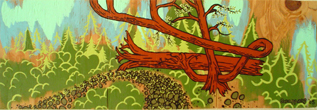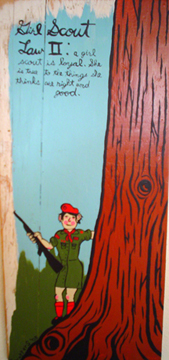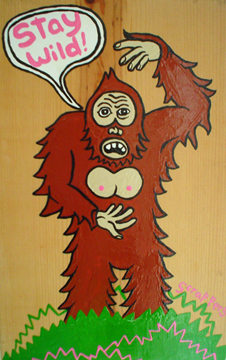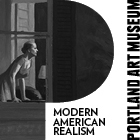|
The Enchanted Forest: Post-modern Optimism
Justin "Scrappers" Morrison at V-Gun
The prolific and eclectic Justin "Scrappers" Morrison has a new show at V-Gun Gallery, located in the Veganopolis restaurant, through September 10th
V-Gun. 412 SW Fourth Avenue. Tel. 503.226.3400
The best introduction to Scrappers is his own artist statement:
The Enchanted Forest
There is a deep far away forest that we can all reach. It is the wilderness inside. It is your wild side. My wild side is home to lumberjacks, savage scouts, happy hobos, vintage beer commercials, protesters, strange trees, unicorn and Bigfoot. They live the way they see fit and I let them be. Maybe someday I'll go join them in the Enchanted Forest, but until then they remind me to stay wild.
All the paint used is recycled, salvaged or eco-groovy house paint. All of the wood was salvaged from dumpsters and houses that were being deconstructed. Recycling is cool, reusing is cooler, reducing your resource consumption and subsequent waste is coolest.
-Justin "Scrappers" Morrison

Scrappers' paintings are at once delightful and defiant. Almost every piece will make you laugh. Scrappers' painting materials are decidedly humble, yet his world of imagery is fantastic and hyperbolic. Scrappers sets clear limitations on his materials and process, using only recycled paint and surfaces. These limitations liberate his playful, imaginative approach rather than inhibit it. Scrappers' definition of the borders of his world allows him to truly "run wild" within that world. Scrappers presents us with small windows into a complex, humorous, and seemingly limitless psychological space.
Trees elasticize and intertwine. An antique beer can appears in the sky surrounded by a glorious mandorla, drawing bears to worship it as an embodiment of recycling martyrdom. Boy scouts swarm the roots of giant redwoods. Ebullient girl scouts mercilessly hunt white bunny rabbits for dinner with huge, primitive bows and arrows, which look more likely to fell a wooly mammoth. Happy but feckless hobos build their shanties in the redwoods. Everywhere jolly lumberjacks smile benignly as they set to the violent task of decimating the redwoods and driving away all of the unicorns and Sasquatch, which you needn't worry about because they don't exist anyway.
Scrappers positions himself as an outsider. He studies the generative matrix of an interior personal mythology, rather than the established canon of painting. Scrappers' work is emblematic of the unique imagery of his identity, a personal dream world.
When modernist optimism concerning the possibilities of perfecting painting by studying tracks of "progress" within the canon finally collapsed into the multifarious nebulae poorly defined as post-modernism, painting struggled to locate itself. Was the history of painting a citadel against the fragmented storm of post-modernism, or was a massive renovation taking place? This question remains to be answered, but it is a clear testament to the continued vitality and relevance of painting that an individual artist can completely alter the "goals" of painting to suit their own idiomatic vision. Post-modernism has an optimism of its own which is just as powerful as modernist ideas of progress. It is an ethos of inclusion and multiplicity. Personal definitions of meaning stand side by side with art historical definitions. There is something for everyone.

Scrappers' work is an operatic recycling fantasy. His environmental concerns form the foundation of his imagery, but are perhaps over-estimated in the final outcome, although 10% of proceeds do go to benefit animal welfare. It is the fantastic humor, touched with pain that one remembers. Scrappers' conservationism becomes a device for spiritual contemplation and catharsis. It is not exactly the forest the lumber jacks threaten, but also the complex identity of Justin Morrison himself. When a girl scout stands protectively near a redwood tree with an AK-47 and recites an oath of loyalty we sense that what we are experiencing is not a simple visual stab at humor, or an ardent plea for conservationism. It is an icon painting of a spiritual guardian, a visual representation of an archetype.
What could be more archetypal than Bigfoot? This emblematic character seems to be a stunt double for the artist himself. Bigfoot functions as a self-portrait, the artist translated into his own interior world. Painted on a wooden plank, standing on a spiky green and pink hill, free of any other indications of setting, Bigfoot gestures expressively, stares us down, and commands us to "Stay Wild."

Posted by Isaac Peterson
on August 02, 2005 at 15:30
| Comments (2)
Although Isaac and I have already discussed the 1st point, Ill post this for the sake of discussion.
1) Modernism was never some blind optimistic march of lemmings to heroic music off some utopian cliff. In fact it was filled with self doubt, sarcasm and critique. Examples... for every utopian Delaunay or Malevich there is a sarcastic George Grosz, Max Beckman, Franz Marc or a Paul Klee. All were ironists and very adept at pointing out a multiplicity of views. What's more, the debatable crown jewel of modernism, cubism was a definite embrace of multiplicity and subjective empowerment as was the focus on non-objective painting. That whole odd revisionist history where Postmodernism laid claim to all irony and doubt was more of a (much needed) rhetorical strategy to take down Greenberg than anything else. Personally, I suspect postmodernism never happened and Yves-Alain Bois among others have stated much the same. Modernism and Postmodernism are lazy terms designed to codify and subdue the avant-garde for use in academia and institutional capital campaign building expansions! (Yes, dangerously close to Marxist critique, but I see it as being more like a metabolism aging than pure market and class manipulation.)
2) Scrappers is funny, has a sure hand and I like his work but I'm having trouble explaining how it isn't just mining the Yogi Bear meets Dexter's lab graphic design and humor well? Hey hey Boo Boo its CD cover art as urban hipster folk art? Nothing wrong with that really but it is somehow less than Howard Finster or Art Brut.
Maybe this is a bit much to ask of Mr. "Scappers" but why not? Either he can claim territory somewhat distinct from the Cartoon network or he can't. At least he isn't some New York artist doing this as a cynical move to land a show in Billyburg. It gets me why few people other than Jerry Saltz have called the cute NYNY artists on their, "I'm innocent don't hit me with a terrorist attack, " shtick. At least this is honest and edutaining, I'm waiting to see what Scrappers does. He is very talented.
Posted by: sheriff jeff at August 2, 2005 07:34 PM
Welcome Isaac, and Greetings to the Thousands of PORT readers Across the Globe!
Jeff,
I find your difficulty explaining Scrappers' Yogi Bear/CD Art aesthetic perplexing given your apologetics for Superflat and your take on Ken Kelly's recent heavy metal/tattoo art inspired painting show. Apparently, irony laden hipster cartoonage is OK as long as it's imported, and Kelly's album inspired art is OK because even though he is a headbanger, he is a Judas Priest (read serious) headbanger with ties to Jackson Pollock and Frank Stella(!). Does your problem with Scrapper stem from his lack of interest in positioning himself within the realm of 'serious' painting?
Predictably, Superflat comes prepackaged with its own twaddle placing itself within art history. One wonders how long it will take for a book called Superlight to come out explaining how America's dominance after WWII, coupled with the rise of Red State Culture led to Thomas Kinkade's use of technologically sophisticated printing and marketing techniques to dominate the art market with a restorative American nostalgia where levels of authenticity are value-added. A further manifestation of the (dreaded liberal elite) art world's prerequisite for self-critique/irony is revealed when you consider the fact that although you can purchase an actual Thomas Kinkade inspired home, your lights will never shine as brightly as those in his paintings and you'll have difficulty finding time to cozy up next to the stone fireplace after working 80 hours a week to make the mortgage payment.
As for Ken Kelly, was the superficial tie to Jackson Pollock and Frank Stella necessary to legitimize the work? It looked to me like he was trying to have some fun with that series of paintings. While painting Skull, I hope to God that he wasn't thinking about how it was historically tied to AbEx. I would hope that his ears were ringing too much from listening to Manowar and Motorhead to think about his position in art history. A more interesting take on Kelly (and several other artists) would be to ask why they are interested in 'low' art forms in the first place? What is this trend bringing to the party? Why are galleries suddenly so interested? Would these artists feel comfortable being compared to 'low' artists like custom car painters and hot shot tattoo flash painters, many of whom kick 'fine' artists collective ass in painting technique and end result? Similarly, the question for Scrapper is why he feels the need to position himself as an outsider? What is it about the 'fine' art world that turns him (and so many others) off?
Posted by: stephencleary at August 4, 2005 05:30 PM
Post a comment
Thanks for signing in,
. Now you can comment. (sign
out)
(If you haven't left a comment here before, you may need to be approved by
the site owner before your comment will appear. Until then, it won't appear
on the entry. Thanks for waiting.)
|























![[TypeKey Profile Page]](http://www.portlandart.net/nav-commenters.gif)